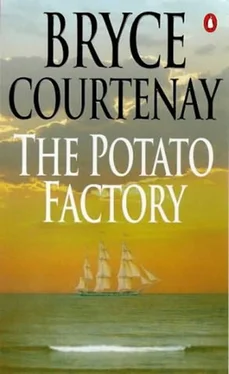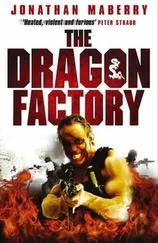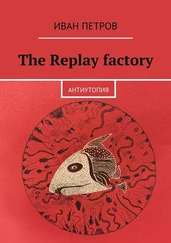But Ikey, as usual, was unpredictable, and he was released not five months after Hannah, rescued from servitude by a high-ranking government official who wished to remain anonymous. The official offered surety for Ikey and the government accepted his bond, whereupon Ikey left Port Arthur where he had served the past year of his sentence. He appealed to the reviewing magistrate to allow him to serve the first three years of his ticket of leave in New Norfolk.
'To live peaceably with my dear wife and children in New Norfolk, your honour. So that we may regain the lost years and grow old in love and kindness to each other.'
The magistrate who had signed Ikey's ticket of leave papers, a man known for his brusque manner, was quick to reply.
'There is much in your record of arrest of this kind of mawkish pronouncement, but very little demonstration of its successful consequence! I trust that on this occasion your high-blown rhetoric means more than the empty words of sentimental balderdash they have been in the past.'
For a moment Ikey's courage returned to him and he begged leave to make a statement. With an expression of deep hurt he offered the following pious testament.
'Your worship, I must beg to defend myself. My record will show that I escaped from custody in England to the safe and welcoming shores of America where no rules of extradition applied to send me back to England. Here I was immediately successful in matters of business but so missed the company of my dear wife and children that I risked all to walk back into the jaws of the English lion in order that we might be reunited.'
'A most fortunate circumstance for justice, but nonetheless a very foolish decision,' the magistrate interrupted.
Ikey continued. 'A decision of the heart, your worship. A decision made by a husband and father who could not bear to be parted from his loving wife and six children. I have suffered much for what your worship calls my mawkish sentimentality, but I would do it again if it should put me even a mile nearer to my loved ones!'
'Methinks you might have made an excellent barrister, Mr Solomon,' the magistrate replied, then added, 'Neither fish, nor flesh, nor good red herring!' He looked sternly at the prisoner. 'Hear me well now, Isaac Solomon, I should advise you not to return to this court. My patience is well nigh worn through!'
The Colonial Times reported Ikey's little oration and many a tear was shed by every class of woman in the colony. Ikey's testament was held up as the epitome of a husband's love for his wife and children. Officers of the court were never popular, even with the free settlers, and the acerbic tongue of the reviewing magistrate served only to enhance the heroic nature of Ikey's charming speech. Despite his notoriety, there were those in the colony who would forever remain most kindly disposed to a man who could sacrifice his own freedom and welfare for the love of his family.
It was this same reportage in the Colonial Times that alerted Hannah to Ikey's imminent return. She scarcely had time to extricate herself and her two youngest children from the home of George Madden and take up residence with David and Ann before Ikey appeared on the doorstep.
Whatever may have happened to Ikey and Hannah in the six years they had been parted, their low regard for each other had changed little. After the initial euphoria of homecoming, much pretended by both, the curmudgeonly Ikey and the vociferous, sharp-tongued Hannah were soon back to their old ways.
Hannah denied Ikey her bed either as a place for rest or recreation. This did not unduly upset Ikey, whose libido had not increased any during his captivity. He was forced to sleep in a corner of their tiny bedroom on a narrow horsehair mattress not much better than the one he'd recently vacated in Port Arthur. When their relationship had settled back into their customary mutual dislike, Hannah had forced him from this space as well. Ikey's adenoidal snoring kept Hannah awake at night, so he was banished to a tiny compartment in the sloping roof where his nocturnal melodies had the advantage of rising heavenwards.
Several months went by, though there was not a day among them that was not fired with vitriol from one or both partners. Ikey had somewhere picked up the habit of drinking, without learning the knack of holding his drink. A mere tipple would send him home cantankerous, with the inevitable result of a dreadful fight with Hannah.
The four children kept their own counsel. They were reared as orphans and knew when to keep out of the way. Nevertheless, David and Ann did not take easily to Ikey treating them like children and, what's more, in a rude and imperious manner. Ikey failed to grasp this; as a child of eight he had been on the streets selling oranges and lemons and his father had beaten him severely if he held back a single penny earned. Now he demanded only that David give him a half portion of his salary. He expected Ann, who had obtained work as a shop assistant, to hand over her entire wage.
They found Ikey smelly and dirty and, as he seldom addressed them by their names, they had little reason to feel he cared for them. In fact, for the most part, he seemed to forget who they were, frequently referring to the nearest child as, 'You, c'mere!' The two younger children were terrified of him and fled at his approach.
Hannah had taken David aside when Ikey first arrived and carefully explained the reason why he should always appear to side with his father. David immediately understood the future advantage to him so he readily agreed. He capitulated to Ikey's demands for money, and dutifully took Ikey's side in his parents' frequent arguments.
But Ikey was not an easy friend to make, and he considered his son a fool to be exploited and humiliated. The young man's patience was growing increasingly thin. He had never liked Ikey, but now he found that he loathed him. David warned his mother that, whatever the reward, he could not take much more.
Hannah, aware that time was running out, decided to broach the subject of the Whitechapel safe with Ikey. She cooked him a mutton stew well flavoured with rosemary, and followed it with fresh curds. She then joined him at the kitchen table after he had pronounced the meal much to his liking.
'Ikey, it's six months we've been together.' Hannah smiled brightly and spread her hands. 'And,' she sighed, '
'ere we still are!'
Ikey let out a loud burp. 'So?'
'Well, we should begin to, you know, make plans, don't you think?'
'Plan? What plans?'
'The safe?'
Ikey picked at his teeth with the sharp nail of his pinkie, retrieved a tiny morsel of meat, glanced at it briefly, then placed his finger back into his mouth and sucked the sliver from it. 'We can't do nothing until I have a full pardon, my dear. It would be too great a risk if we were to be seen to come into a great fortune while we are both still ticket o' leave lags.'
'We could send David to England. 'E could return with the money and purchase property on the stum and to yer instructions,' Hannah suggested.
'And just 'ow would we send 'im?' Ikey asked, a fair degree of sarcasm in his voice. Then he shrugged. 'We are penniless, my dear, stony broke and without a brass razoo!'
'The cottage in Hobart – we could sell it. That would be sufficient with some to spare.'
'And 'ow do we know we may trust him?' Ikey asked.
'But 'e's our son!' Hannah protested.
'So?'
'E's our own flesh and blood, and a fine young man what we should be proud to call our own!'
'Is that so, my dear? 'E were a boy when 'e went into the orphanage, and 'e came out a man. But what sort of man, eh? We don't know, we ain't been there to watch 'im grow. What sort of boys do you think come from orphanages then? I know boys well, very well! Let me tell you somethin' for nothin', boys what has been in an orphanage are good for bloody nothin' and not to be trusted under any circumstances.'
Читать дальше












